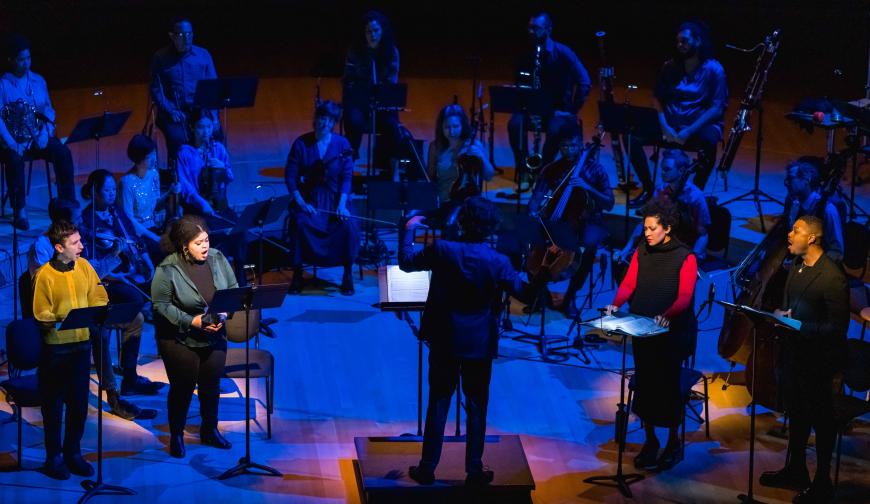
Right away, when the biblical news comes to Mary that she will bear a divine son, she feels the power of “contradictory angels,” as the Mexican author Rosario Castellanos describes it in her poem “The Annunciation.” In that telling line, the kinetic energy of El Niño: Nativity Reconsidered takes hold.
First presented in New York in 2018, this hourlong “distilled” version of John Adams’s 2000 opera-oratorio proved at once intense and expansive in a single performance at Stanford’s Bing Concert Hall on Dec. 13. By interleaving King James Bible verses and apocryphal texts with vivid Spanish-language poetry in a libretto arranged by Peter Sellars, the piece gives the story of Jesus’s arrival a rich, at times unnerving complexity of feeling and force. The miracle comes tinged with a sense of menace, the sublime shaded by violence, beginnings with foreboding futures.
This shorter El Niño, which trims the original’s running time in half, was conceived and performed by the American Modern Opera Company (AMOC). The troupe’s four superb singers, backed by an ensemble of 19 musicians under conductor Christian Reif, who also arranged the chamber-sized score, brought an intimate, sustained focus to the narrative. It’s altogether fitting that the last word in the 12th and final section of the bilingually supertitled text is “poesia” (or “poetry”). Such was the concentrated fusion of words and music at the Bing.
Soprano Julia Bullock, compelling as ever, opened the evening with a half-spoken, half-sung “Annunciation.” “You exalt my humility,” she sang, her voice warm with innocence, over simple open string harmonies. But soon enough, in “Talk of Gabriel,” Bullock scoured up the fierce pressures of pregnancy and giving birth, the boredom and blood, “the wound of his departure,” the orchestral chords now quietly keening.
Here as elsewhere, El Niño raises the personal and political stakes of religious belief, the layered meaning of a child “occupying” both the womb and the fractious world he (or He) enters. Bass-baritone Davóne Tines captured the beauty of Christ’s transformative grace in a wonderstruck aria about the physical world — sheep and sea, wind and streams — stilled by this child’s birth.
Contralto Jasmin White and countertenor Anthony Roth Costanzo, both splendid, joined in as supporting voices at first, with shining solo passages to come. While the full-length version of El Niño calls for a full orchestra and choir (and has been supplemented at times by film and puppetry), AMOC’s Nativity Reconsidered made the passion, vision, and range of Adams’ score stand out in close, high relief.

The orchestra thrummed tenderly in the “Magnificat.” Tines made the heavens shake so potently, driven by orchestral hammer blows, that the house lights flashed on at several points, as if in volcanic response. In “When Herod Heard,” a loose, inquiring jazz riff emerged. Moments later, as the star summoned the three wise kings to Bethlehem, the singers answered and echoed each other in the cadence of medieval hockets. Costanzo floated the kings’ belief that “love is everything” over a gently rippling piano figure. Musical time opened up across the centuries.
There were still terrors to come, none more vivid than the one Bullock conjured with her furious “In Memory of Tlatelolco.” The text, by Castellanos, addresses a 1968 massacre of protesters by Mexican police. In Bullock’s gripping account, it became a fiery universal plea for the dispossessed, the blighted, and the forgotten. The tragedy of the war in Gaza came to mind, of a world gone darkly godless.
With the fable-like “A Palm Tree,” El Niño: Nativity Reconsidered reached its gentle, consoling end. As Jesus made a tree bend to offer sustaining fruit and water to his parents, the strings shivered softly in wonder. The audience, too, had been richly fed.
Like The No One’s Rose, an ambitious hybrid piece mounted by AMOC at the Bing in 2021, El Niño: Nativity Reconsidered has affirmed this company as one of high ambition and accomplishment. Wherever and whenever these artists return, attention must be paid.




